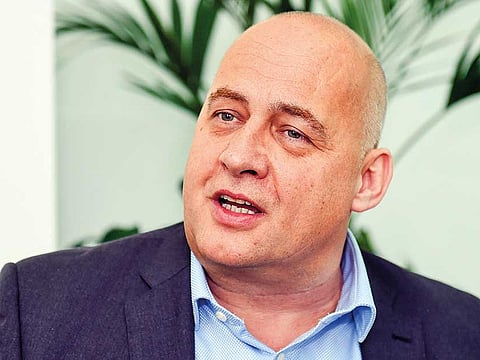A waste-free economy catches on at Davos
Foundation pushes economic system where product lifespans are extended, components reused

Davos: When British yachtswoman Ellen MacArthur was promoting the idea of the circular economy on the sidelines of Davos in 2012, the big attraction was curiosity about what she was up to after her sailing career. Eight years on, MacArthur’s vision is taking hold at the World Economic Forum’s annual gathering, and firms such as Adidas and Unilever, as well as asset management giant BlackRock Inc. are embracing it.
“We had our own event in one of the hotels, and to be honest most people came because they were intrigued about what I might be doing,” said MacArthur, who once held the world record for the fastest solo circumnavigation of the globe. “Things have changed enormously since then.”
Her foundation is pushing an economic system where product lifespans are extended and components used repeatedly. Waste is eliminated by designing products that can be reclaimed, re-used and re-manufactured. In practical terms, for a company such as Apple Inc., that means making new iPhones with parts from older models.
We need to move to a circular business. We’ve got a long way to go, but I’m very positive we’ll get there. If we set our minds to it we will achieve it.Marc Engel, chief supply chain officer at Unilever
The idea is about replacing the “linear” model of growth — extraction, production and disposal — and reducing the strain on the planet’s limited resources.
“We need to move to a circular business,” Marc Engel, chief supply chain officer at Unilever, told a Bloomberg Live panel in Davos. “We’ve got a long way to go, but I’m very positive we’ll get there. If we set our minds to it we will achieve it.”
Unilever is among the business represented in Davos which are taking steps. It has pledged to reduce the amount of plastic packaging it produces by 14 per cent each year by 2025. Adidas wants to almost double the number of shoes produced from recycled plastic this year to 20 million. Nestle SA has also set targets to slash packaging, while Alphabet Inc.’s Google has begun advising companies on how to harness data to better manage resources.
BlackRock started a fund focused on the circular economy in October alongside the Ellen MacArthur Foundation. At $23 million, it’s a drop in the ocean for the $7.4 trillion asset manager, though still a meaningful development as CEO Larry Fink puts environmental concerns at the centre of the firm’s investment process.
Wide-scale adoption
Wide-scale adoption of the concept would not only cut costs and bolster productivity, advocates say, but climate change and pollution would be tempered. It represents a $4.5 trillion-dollar opportunity globally by 2030, according to Peter Lacy, author of ‘The Circular Economy Handbook.’
But some academics argue that it doesn’t address what they see as the fundamental problem of pursuing limitless growth. Still, retailers are also acting. H & M, criticised for its part in so-called “fast fashion,” is trialling a rental clothing service in one of its Stockholm branches as well as an in-store repair service. British start-up Hurr offers clothing rental, as does Rent the Runway Inc. in New York.
The global economy now needs 100 billion tonnes of materials a year, according to the not-for-profit organisation Circle Economy, a figure set to more than double by 2050. Historically, for every 1 per cent increase in GDP, resource usage has risen on average 0.4 per cent.
The flow of materials accounts for more than half of emissions in OECD countries. Reducing that insatiable demand could therefore go a long way in achieving the global target of limiting temperature increases in the atmosphere to below 1.5 degrees Celsius.
100 billion tonnes
The global economy now needs 100 billion tonnes of materials a year, according to the not-for-profit organisation Circle Economy, a figure set to more than double by 2050. Historically, for every 1 per cent increase in GDP, resource usage has risen on average 0.4 per cent.
“What we’re looking at is, how can we actually decouple some of the trends we’ve seen in terms of increasing consumption, increasing pollution and emissions, from growth prospects,” said Helen Mountford, vice president for climate and economics at the World Resources Institute. “We’re already exceeding or rapidly approaching a number of planetary boundaries.”
BlackRock isn’t the first money manager to embrace the circular economy. Some smaller firms have been running funds focused on it for a number of years.
Geneva-based Decalia Asset Management, which oversees 3.7 billion Swiss francs ($3.8 billion) in total, launched such a fund in 2018. It gained nearly 23 per cent in 2019.
Circularity Capital in Edinburgh has a £60 million private equity fund that’s invested in businesses such as Winnow, a food waste reduction company, and ZigZag, which reduces retailers’ product return waste.
Challenges
The key challenge is getting more governments and companies on board. The European Commission has a circular economy action plan, which includes transforming the way plastic products are produced and recycled. It’s also part of China’s five-year plan. The government there has stopped importing waste, something that’s forcing other countries to adapt.
“When you set off on one of those long journeys, the resources you have with you are the absolute minimum you can survive with, to be as light as possible to stand any chance of breaking a record or winning a race,” MacArthur said. “I realised the global economy was the same — we have finite resources, and yet we’re using them up.”






